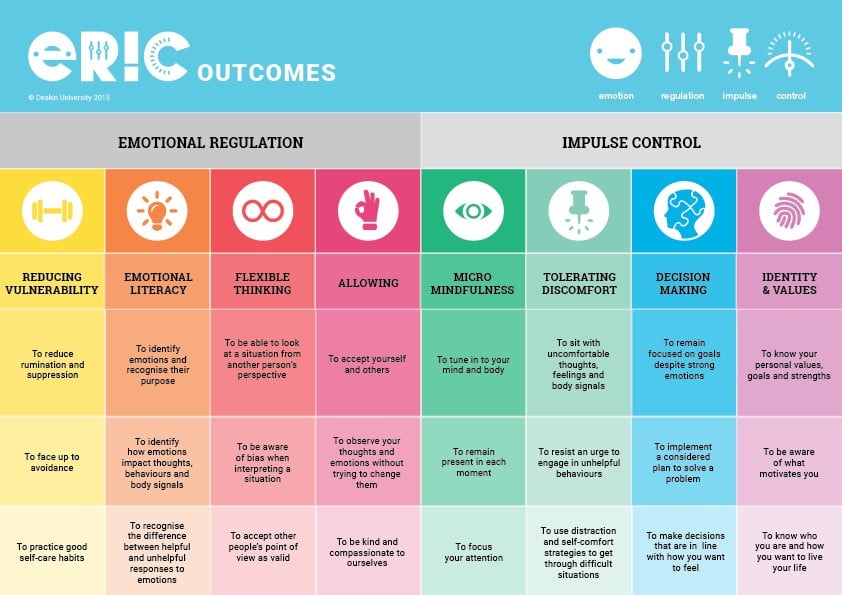What does ERIC target?
ERIC builds social and emotional skills across eight domains. Each domain targets important processes or strategies to help young people build skills in areas that are important for regulation and impulse control.

The eight ERIC domains were derived from the empirical and theoretical literature on emotion dysregulation and impulsivity.

The Reducing Vulnerability domain targets the use of maladaptive emotion regulation strategies. Specifically, this domain focuses on reducing rumination, suppression, and avoidance while increasing self-care.

The Emotional Literacy domain targets emotional clarity, which is the ability to identify and name emotions, and tell the difference between emotions as they occur. This domain focuses on the function of emotions, the impact of emotions on thoughts, behaviours and body signals, and explores the difference between helpful and unhelpful responses to emotions.

The Flexible Thinking domain teaches strategies to develop cognitive reappraisal skills. Learning how to look at situations from other people’s perspectives, and being aware of personal bias when interpreting situations, can help turn down the intensity of emotions.

The Allowing domain emphasises the important role that taking a non-judgmental and accepting stance has in facilitating adaptive emotional outcomes and promoting wellbeing. This domain focuses on being accepting of self and others, observing thoughts and emotions without trying to change them, and adopting a kind and self-compassionate approach.

The Micro Mindfulness domain explores building habits to remain present in each moment in order to step out of ‘automatic pilot’ and increase the opportunity to apply adaptive emotion regulation skills. Specifically, skills in this domain target tuning in to the mind and body, remaining present in each moment, and learning how to focus attention.

The Tolerating Discomfort domain encourages the development of strategies to help get through a difficult situation without making it worse. Skills include learning how to resist urges to engage in unhelpful behaviours, practicing non-avoidance by sitting with uncomfortable thoughts, feelings and body signals, and the development of distraction and self-comfort plans to get through difficult situations.

The Decision Making domain draws together the concepts of values-based decision making and problem solving to reduce impulsive or avoidant ways of responding to a stressful situation. This domain involves building decision making skills in line with how you want to feel and the values that matter to you, and remaining focused on goals despite strong emotions.

ERIC’s Identity and Values domain focuses on identifying and connecting with personal values and increasing motivation for positive change. Specifically, this domain explores getting to know your personal values, goals and strengths, increasing awareness of what motivates you, and identifying who you are and how you want to live your life.